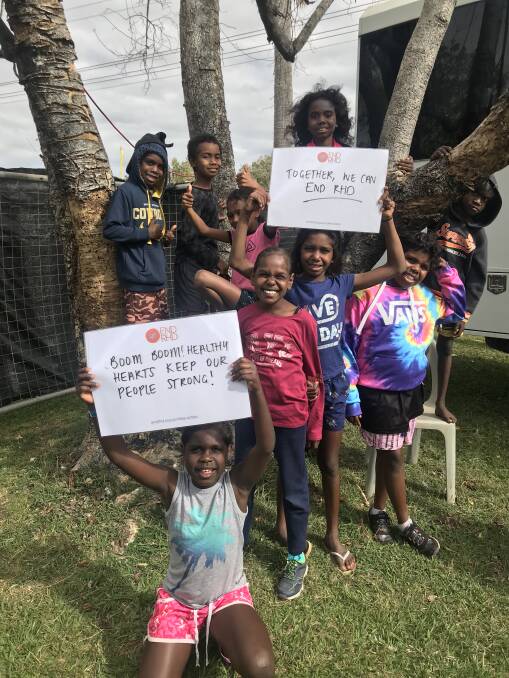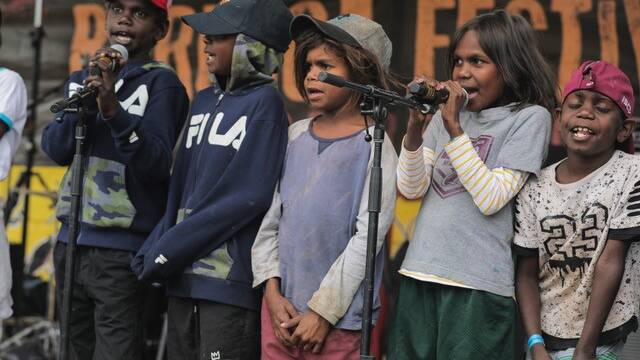
Indigenous children in the remote community of Barunga have put together a catchy song in the hope it will save others from a crippling disease killing thousands.
Subscribe now for unlimited access.
or signup to continue reading
Rheumatic Heart Disease has been eliminated in most developed countries and most Australian cities, but remains a devastation in rural and remote communities.
It starts with a skin sore or a throat infection, but if left untreated can lead to open heart surgery or death.
Written for kids, by kids in the small community, the song, 'Boom Boom' is relaying a vital message: don't wait to visit the doctor.
"Wash your hands, keep your skin clean, prevent rheumatic heart disease, help your friends and families," are just some of the words.
Anne Marie Lee, a community worker who is leading the End RHD Communities project in Barunga has high hopes the song will spread the message through the NT's remote communities, and save lives.
She has been working in the remote town, about 100km from Katherine, for the past 18 months, looking after those impacted most.
Seeing that the issue was not going away - new data shows rates of rheumatic heart disease are on the rise with 53 per cent of all diagnoses stemming from the Northern Territory - she needed a simple way to get the message across.
"When we worked on putting the song together, the kids who don't have rheumatic heart disease were shocked," she said.
"It opened their minds up."
In the time it took to write the song, and make the video, she was already seeing a change.
"The song has a message and meaning that if you or a family member has a sore, don't leave it, and we have already noticed kids taking that on."
Dr Rosemary Wyber a general practitioner and research lead for the End RHD Communities Project said the catchy tune communicates the message in an accessible way.
Experts working in the field have found there are significant issues with language barriers making it hard to communicate the importance of getting checked out and keeping on top of the life-saving treatment, often an injection of penicillin every 21 to 28 days.
"There is no point in us coming from our big capital cities and telling these kids what is important," Dr Wyber said.
"The message needs to come from these young voices to really get through."
Working in the NT as a GP until 2017, Dr Wyber saw the full extent of the burden of disease.
She now spend the majority of her time tackling RHD nationally.
"RHD cuts lives short, and it shouldn't be happening.

"We are at a point where we have the answers but we need to work on how to put them in place."
On the ground, organisations and communities are working hard to prevent the spread, but a commitment from the Government to end rheumatic heart disease is still needed.
While scientists are working on a vaccine, 2018 Northern Territory Australian of the Year and the Territory's only paediatric cardiologist, Dr Bo Reményi, said we cannot wait.
"We need to take action now to prevent, identify and manage RHD - we cannot wait for a vaccine or other solutions because while we wait thousands of people will become ill, and hundreds will die."
Speaking at the 15th National Rural Health Conference, in March, Dr Reményi called for major political parties to commit to immediate community-led, on the ground action to prevent and eliminate RHD.
"RHD is the best marker for disadvantage between Indigenous and non-Indigenous Australians," Dr Reményi said in her speech.
"Some of our communities have the highest rates in the world of this disease - young children are being subjected to painful treatment and even open heart surgery, and they are dying way too early."
She said RHD is the greatest cause of cardiovascular inequality for Indigenous people in this country.
The Northern Territory has been hit hardest hit by rheumatic heart disease with the highest number of cases by far.
A new report shows more than 1,000 new cases of RHD were diagnosed among Indigenous Australians between 2013-2017.
"If we don't close the gap on RHD, we cannot close the gap between Indigenous and non-Indigenous life and health outcomes," Dr Reményi said.
ABC presenter Justine Clarke and Darwin record label Skinnyfish Music played key roles in bringing the vision to life.
While you're with us, you can now receive updates straight to your inbox each Friday at 6am from the Katherine Times. To make sure you're up to date with all the news, sign up here.

